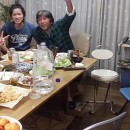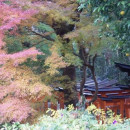An Unforgettable, Rewarding and Amazing Experience at Kansai Gaidai Unversity, Japan Past Review
By Danielle N (Biology, General., Illinois State University) for
Kansai Gaidai University: Hirakata - Direct Enrollment & Exchange
Yes, it was great!
Review Photos




Personal Information
| How much international exposure did you have prior to this program? | 0-2 weeks |
Review Your Program
|
* Overall educational experience
Academic rigor, intensity, resources, etc. |
I feel that Illinois State University is just as good as Kansai Gaidai University. Globally they both fulfill the needs of students in every way possible, it's just up to the student to decide if they want good grades or not by putting in the effort. Kansai Gaidai has a very social, relaxed atmosphere which I loved, and yet it was still a challenege at the same time. Compared to my usual Biology related classes, my classes at Kansai Gaidai were a break for me. But for others it might have been more of a challenge. Even though I'm a Biology major, I still felt I had a healthy challenge at Kansai since I wanted all A's in my classes. I learned and picked up so much more Japanese than I ever expected. The Japanese classes that I took in Japan were more difficult than any I had ever taken at my home university, so I was very pleased about that and I learned a lot. |
|
* Host Country Program Administration
On-site administration of your program |
|
|
* Housing:
How satisfied were you with your living arrangements? |
|
| * Food: |
Japan has very delicious food, and this is coming from someone who use to hate all Japanese food. Sometimes the food is healthy, sometimes not. Either way, you won't get FAT in Japan. I lost 5 lbs. since going to Japan, and I think it was a combination of the extra exercise that I needed to get to school and back, as well as the Japanese style of cuisine. Japan eats mostly WHITE products (such as white bread, pasta, noodles, rice, etc.) instead of WHEAT, so this was one downfall. Ice-cream and SOME (but not a lot) junk food was available in Japan, but it was all very expensive. Fruit is also very expensive. One piece of fruit in Japan (whether it be a tomato, apple, orange, etc.) is always at least an equivalent of $2. However, local Japanese vegetables were much cheaper. Fish is readily available in much variety and it seemed to take up at least half of the space in the grocery store. There seemed to always be an emphasis on how food looks in Japan, which I felt was a nice touch to making the food more enjoyable and satisfying. Believe it or not, average portion sizes for me usually felt too large, but it kept me full at the same time, leaving me full until the next meal time. This was a big change for me since I use to snack throughout the day instead of eating 3 big meals. However, I liked that REAL food (aka healthy food) was prepared in larger portions while junk food (such as ice cream, puddings, etc.) were usually in very tiny portion sizes (as compared to the US standard). In this way, I felt that Japanese culture placed an emphasis on eating real, wholesome foods instead of quick, cheap, and unhealthy junk food. Not every culture is perfect, however, as Japanese food as its downfalls as well, such as using too much salt, white instead of wheat, MSG, and many other foods were also processed and unhealthy. |
|
* Social & Cultural Integration:
How integrated did you feel with the local culture? |
Kansai Gaidai is in a great location. It is technically part of Osaka, but it is about a 1/2 hr. or so from the inner city part of Osaka, and also relatively close to both Nara and Kyoto, both very famous places in Japan. Nara was my most favorite place since you get to feed the deer out in the open, and it had a very relaxed, park-like feel to it. Kyoto is very traditional with tons of Buddhism universities and temples/shrines. Osaka has amazing shopping districts and a great place to hang out with friends and eat delicious Osakan food, such as ramen, okonomiyaki, and special ice-cream shops. In Kyoto, I got to visit both Kiyomizudera and the Kinkakuji. If you go here in the fall semester, the fall leaves are very beautiful to view all over the country and especially at the temples in Kyoto. Great experience. =) |
|
* Health Care:
How well were health issues addressed during the program? |
|
| * Safety: |
|
| If you could do it all over again would you choose the same program? |
Yes
|
Finances
|
* Money: How easily were you able to live on a student's budget?
(1 = not very easy/$200+ on food & personal expenses/week, 2.5 = $100/week, 5 = very easily/minimal cost) |
|
| Not including program expenses, about how much money did you spend on food and other expenses each week? | Not going to lie, but right now it is very expensive in Japan. But if you're good at saving money, then go for it. With the current exchange rate between the yen and dollar, it's pretty horrible, but one thing I came back from Japan learning was how to save money better since mostly cash is used over there, and NOT usually CREDIT CARDS. |
| Do you have any general money-saving tips for future study abroad participants? | A lot of my Japanese friends enjoyed Hyaku en shops (100 yen shops - they are like $1 stores), but as for me, I personally didn't like them that much. But it is probably a good way to save money, nevertheless. |
Language
| * Did your program have a foreign language component? | Yes |
| How would you rate your language skills at the beginning of the program? | Intermediate |
| Language acquisition improvement? |
English was readily available among friends and school faculty, such as those working in the CIE (Center for International Education) Building. Even many local Japanese students at Kansai knew English well to a certain degree. If living in the dorms, it can sometimes be harder to practice Japanese as much as one would like, but as long as one puts themselves out in the open and makes a lot of Japanese friends (which is very easy to do), Japanese language abilities will undoubtably improve. Having a speaking partner and also a host family is really helpful. Even though I did not stay long, my host mother didn't know any English, so in the end I learned a lot of Japanese from her, even though it was frustrating at the time. It becomes frustrating to learn a new language fluently, but the more difficult it is, the more you end up learning without realizing it. I also felt that I learned a lot of Japanese when shopping or going to places where other Japanese (not foreigners) usually go, and where English proficiency is not expected from the employees. Sometimes it is helpful to go on hitori tabi's (one person journeys) so that you can only rely on yourself to get through everyday Japanese life and conversation. I would warn against going out with your Japanese friends if they know both English and Japanese fluently, because then they will want to help you with everything language-concerned, instead of you helping yourself. |
Direct Enrollment/Exchange
| * Did you study abroad through an exchange program or did you directly enroll in the foreign university? | Direct Enrollment |
Other Program Information
|
* Where did you live?
Select all that apply |
|
|
* Who did you live with?
Select all that apply |
|
|
* Who did you take classes with?
Select all that apply |
|
A Look Back
| * What do you know now that you wish you knew before going on this program? | Please come here if you have an ongoing interest in Japan and its culture. It will help you realize what their culture and lifestyle is REALLY like, apart from the limited exposure you get on the internet and media through anime, manga, TV shows, etc. Explaining Japan to others is useless unless that person comes for themselves to see what the country is really like. |
Individual Course Reviews
| Course Name/Rating: |
Japanese Buddhism |
| Course Department: | |
| Instructor: | Kennedy |
| Instruction Language: | English |
| Comments: | I enjoyed learning about Buddhism because it is such a foreign topic in America's society that I never had the chance to learn about before. I felt that it really opened my eyes up to not only Japanese culture, but to all of Asian culture in general, since cultures are always tied closely to religion. It was an easy-going course and not much work involved, but somehow a lot was learned and obtained because I felt that the instructor was a very good one. She is highly reccommended. |
| Credit Transfer Issues: |








